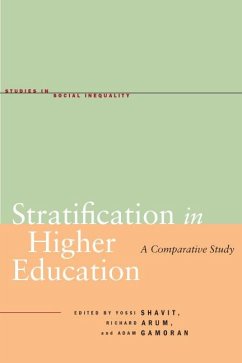Nicht lieferbar

Cuba's Academic Advantage
Why Students in Cuba Do Better in School
Versandkostenfrei!
Nicht lieferbar
In this book, Martin Carnoy explores the surprising success of the Cuban educational system, where the average elementary school student learns much more than her Latin American peers. In developing the case for Cuba's supportive social context and centralized management of education, Carnoy asks important questions about educational systems in general. How responsible should government be for creating environments that encourage academic achievement? How much autonomy should teachers and schools have over their classrooms? Is there an inherent tradeoff between promoting individual choice and ...
In this book, Martin Carnoy explores the surprising success of the Cuban educational system, where the average elementary school student learns much more than her Latin American peers. In developing the case for Cuba's supportive social context and centralized management of education, Carnoy asks important questions about educational systems in general. How responsible should government be for creating environments that encourage academic achievement? How much autonomy should teachers and schools have over their classrooms? Is there an inherent tradeoff between promoting individual choice and a better system of schooling? >









